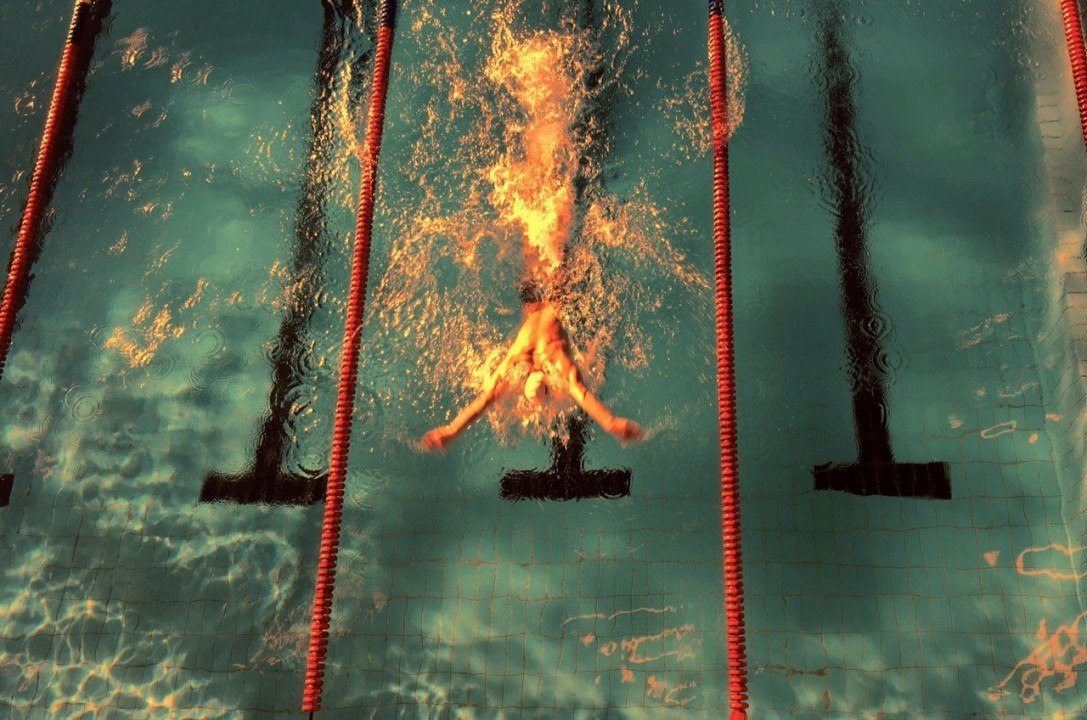by Olivier Poirier-Leroy. Join his weekly motivational newsletter for competitive swimmers by clicking here.
There was approximately zero reason to believe that Jon Sieben would compete for the gold medal in the 200m butterfly at the Los Angeles Olympics.
Two years earlier he’d collected a bronze medal at the Commonwealth Games. He was ranked 25th in the world in the event heading into Los Angeles. Sieben’s personal best time was over four seconds slower than that of the favorite and world record holder, Michael Gross of West Germany. Sieben’s nickname—“The Shrimp”—didn’t exactly strike fear into the hearts of the competition either.
And yet, Sieben would pull off one of the greatest upsets in swimming history, dethroning Gross and committing grand larceny on the world record in the process.
How?
By mastering the role of the underdog.
“We clipped his wings…”
Swimmers train and race with one eye on the black line and the other on the clock. They commit a hysterical amount of time and energy to see the clock stop just a fraction of a second sooner.
So you can imagine the sheer joy of seeing four seconds being shaved from your personal best time in a 200m race.
This was the kind of day 17-year old Australian Jon Sieben had on August 3, 1984.
During the morning preliminaries Sieben cracked two minutes, swimming 1:59.63, securing him lane six for the final. Cruising through with the fastest seed time was the tall and lanky Gross, known as “The Albatross” for his endless wingspan which fully extended was over seven feet. Rounding out the contenders was American butterfly champ Pablo Morales in lane three and Venezuelan Rafael Vadal in five.
In this corner, at 6’7”, the world record holder, The Albatross. In the other corner, standing at 5’9”, The Shrimp. The chlorinated version of David and Goliath. No slingshots here, just Speedos.
As the race got underway Gross sailed out to a half body length lead by the 25m mark. No shocker there.
Out in lane six, Sieben cruised along, jockeying in the middle of the pack with Tom Pointing of Canada in lane seven.
Turning at the halfway mark Gross was a shade over his own world record pace, Morales and Vadal in hot pursuit. The three men charged into the final turn, Sieben a body length and a half behind.
With Gross and company thundering for the finish, the 17-year old Australian punched the nitro and began to mow down the leaders. His stroke rate picked up as the leaders began to labor. By 175m Sieben was positioned to compete for a medal. By 195m Sieben was competing for the unthinkable.
On the final couple strokes Sieben passed a seizing Gross to touch first.
Gold to Sieben…
And a new world record.
Sieben swam a 1:57.04, shaving the smallest margin possible—1/100th of a second—off Gross’ world record.
Sieben’s coach, the legendary Laurie Lawrence, was jubilant.
“We clipped his wings, the big fella [Gross],” Lawrence said. “It’s been fantastic. I knew Sieben could go good but I didn’t realize he could get the world record. I’m out of my tree.” [1]
How did Sieben do it?
How did he toss aside one of the greatest swimmers on the planet?
And max out his potential and training on the day it mattered most?
By relishing the role of underdog.
“This morning I was looking at getting a medal, I didn’t really think about winning,” said Sieben after the race. “I didn’t let anything bother me or worry me. I felt comfortable. There wasn’t any pressure on me.” [1]
The Role of Expectations
Expectations and pressure for swimmers are a tricky thing, and we all react to them in different ways in different situations.
In some cases, we use our high expectations to fuel a better effort. We expect to be good, we know we are good, and so we rise to the level of our expectations.
Other times we use the low expectations of others combined with the high expectations of ourselves to create memorable performances. This is where the underdog lives, the sweet spot between wanting to prove others wrong and proving ourselves right.
Although Sieben wasn’t favored, he had the calm confidence to know that he would perform well, and the advantage of being able to fly under the radar, with all eyes on the world record holder in the middle of the pool. Before his race, Sieben had to tell the exuberant Lawrence to chill out a little bit.
“I know what I am doing,” Sieben told his coach [2].
How to Embrace the Underdog Mentality
We love a good underdog story and we’ve each had moments in the pool where we’ve embraced underdog status and seen good things happen as a result.
We qualify in lane eight but end up competing for a medal. We are a body length behind on the anchor leg of the relay and catch the leader. We move up to a faster group and end up pushing ourselves because we don’t have to stress about leading the lane.
When external expectations are low, we are free to do our best without fear.
But what happens if you are not actually the underdog? What happens if you are the swimmer in lane four?
Great question.
And the answer is something you can apply to make yourself the underdog even if you are not.
The motivated underdog thrives in situations where they want to prove themselves right and prove others wrong. This combo creates a motivational climate that gives us the aggression and motivation to show others what we can do while also possessing the confidence to know we are capable of big things.
Wielding this mentality is why the very best stay at the top and why some athletes absolutely shine when things appear to be the toughest.
Michael Phelps is a prime example.
The GOAT might have hated to lose, but he loved being the underdog even more.
Wait, what?
Michael Phelps…underdog?
Doesn’t seem to add up when the guy is the greatest athlete to lace up a swimsuit. But this was one of his tried-and-true mental approaches when it came to getting prepared to race.
When Ian Thorpe and Dan Talbot, a coach for the Australian swim team heading into the Beijing Olympics, voiced their doubts about Phelps’ run at eight gold medals in one Games, it lit a fuse:
“I don’t want to say it’s more ammunition, but it kind of is,” Phelps said. “It’s just one thing I’ve always loved, just proving somebody wrong, making them eat their own words. As a kid, I just wanted to beat everybody. I do want to win all the time, but it’s also proving other people wrong.” [3]
Even though most observers would have been hard pressed to consider Phelps an underdog, the comments made by the Australians gave him the gift of the outlook that motivated him best.
One of the odd benefits of considering yourself an underdog is that pressure and external expectations lose a lot of their sting. Your swimming suddenly is about proving others wrong instead of not disappointing others.
This approach helps you to stay focused on your own performance. It allows you to channel aggression and vigor towards the execution of your race plan. And it frees you from the pressure and expectations of others.
Back to Sieben:
“There was no pressure on me and I felt completely relaxed before the race and during the race.”
How you can be an underdog on the regular:
Here are some things you can do to benefit from the underdog mentality:
Everything is motivation. The victories, the losses, the haters, the improvements in performance and the bad practices—use them all to shower gasoline on your motivational fire. Elite athletes have a way of finding ways to motivate themselves, and the better you get in the water the more critical this skill becomes.
Imagine the low expectations others have of you. It doesn’t take much creative energy to do this—thinking about how the competition underestimates you. Or even how much your coach or teammates underestimate you. If others have low expectations of you—fine, so be it. Remember them and use them as fuel.
I suppose it should be obvious, but in today’s age of the disclaimer I will say it: Latching onto the slights of others (perceived or otherwise) and obsessing endlessly over them isn’t healthy and defeats the purpose. Use them tactically to inject bursts of high-octane effort into your training and racing.
It’s how you finish, not how you start. Leading isn’t always advantageous—when researchers looked at the results of 45,000 collegiate basketball games they found that teams who were behind at halftime by a point were 6 percentage points more likely to win than the team that was leading by a point at halftime. No matter how things are looking—like, say, if you are two seconds back on the last turn of a 200m butterfly race—it’s how you finish. Finish strong, all the time.
Final Thoughts
Being the underdog is a classic case of something that appears to be a disadvantage actually being a performance booster.
Sure, you might have to train in a facility that isn’t as awesome as your competition. Maybe your coach isn’t All-World caliber. Perhaps your training mates are more learn-to-swim than dominate-the-podium.
And maybe the swimmer in lane four is the world record holder and almost a foot taller than you.
But you can use these so-called disadvantages as fuel.
Not only will it free you of the pressure that comes with having the best of everything, but you will develop a layer of resilience that will make you bullet-proof in the heat of competition.
ABOUT OLIVIER POIRIER-LEROY
Olivier Poirier-Leroy is a former national level swimmer. He’s the publisher of YourSwimBook, a ten-month log book for competitive swimmers.
 He’s also the author of the recently published mental training workbook for competitive swimmers, Conquer the Pool: The Swimmer’s Ultimate Guide to a High Performance Mindset.
He’s also the author of the recently published mental training workbook for competitive swimmers, Conquer the Pool: The Swimmer’s Ultimate Guide to a High Performance Mindset.
It combines sport psychology research, worksheets, and anecdotes and examples of Olympians past and present to give swimmers everything they need to conquer the mental side of the sport.
Ready to take your mindset to the next level?
Click here to learn more about Conquer the Pool.
COACHES: Yuppers–we do team orders of “Conquer the Pool” which include a team discount as well as complimentary branding (your club logo on the cover of the book) at no additional charge.
Want more details? Click here for a free estimate on a team order of CTP.


That was a great race! I’ll never forget Jono pulling away at warp speed. I think the entire final was over the moon for him.
It’s impossible to tell Lawrie Lawrence to chill out.
He paced it perfectly. Watch the video and you’ll see he starts to make his move going into the 150 turn.
The final 50 he’s accelerating and everyone else is dying and sinking lower in the water (the dreaded piano). He hits the finish perfectly and wins the gold medal.
Beyond the underdog story, it’s a master class in pacing the 200 butterfly.
I suggest the readers head over to YouTube and watch history in the making. It is heartwarming to see Gross’ reaction of genuine happiness for Sieben’s victory. It was rare then just as much as it is now. Gross was a class act in defeat and victory. Good on ya, Michael!
Here’s the link:
https://www.youtube.com/watch?v=5ukQM1cvmoQ
Thanks ! Brilliant swim. ( the main commentator from the US is no better than most current US commentators).